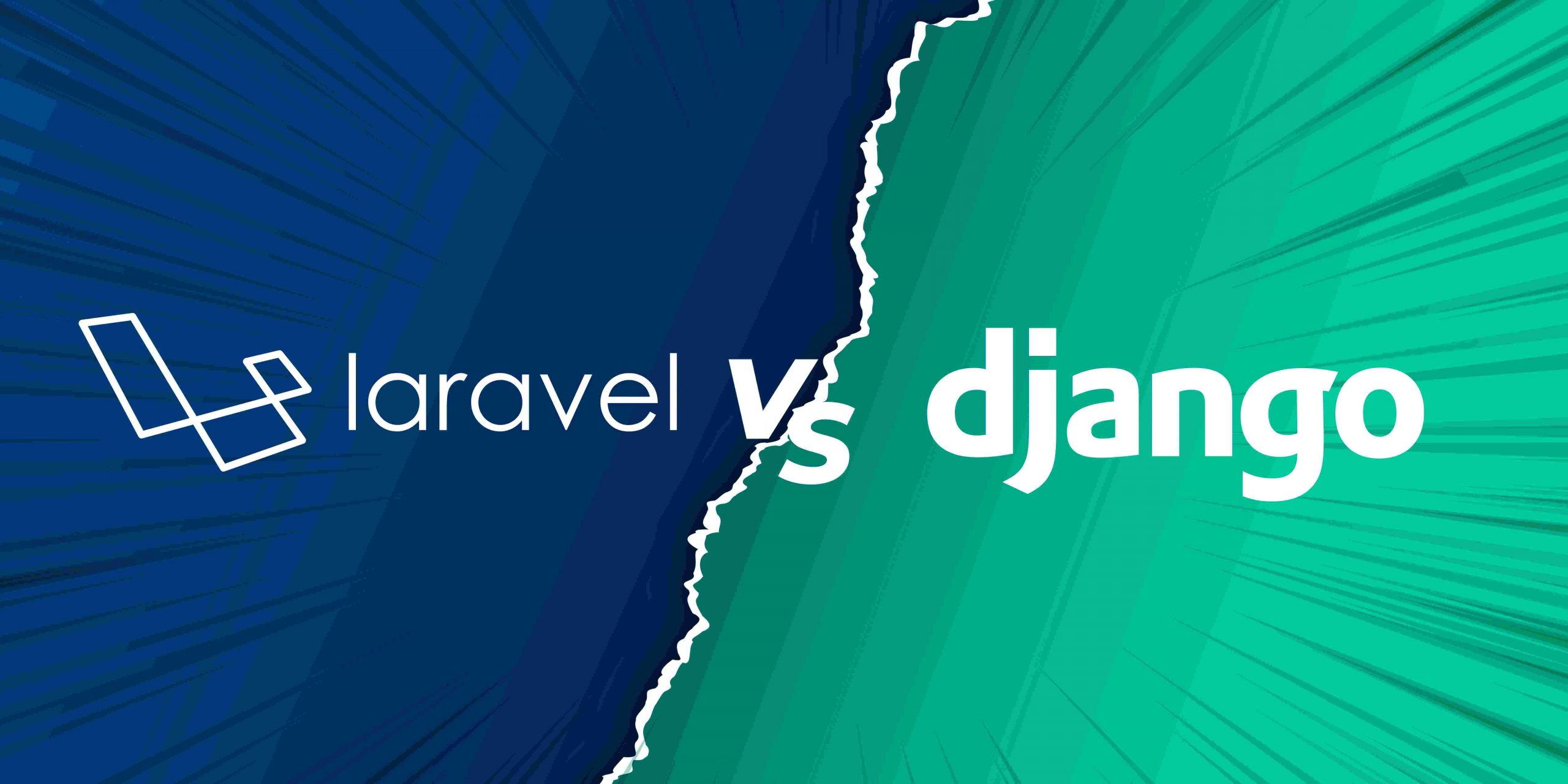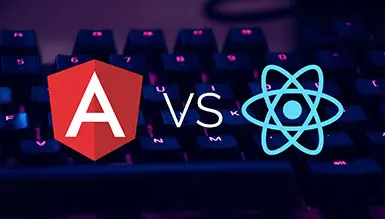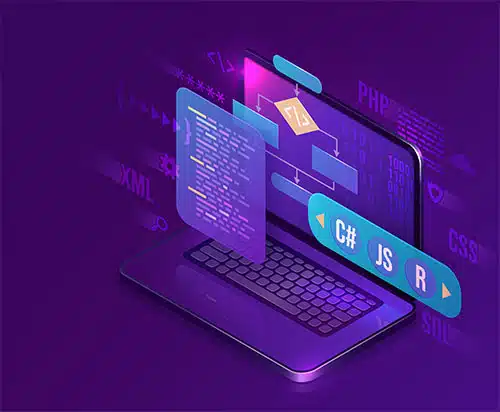Are you looking for the best web development framework to develop your web application? If yes, then here is a quick guide for you. In this blog, we are comparing the top two web application development frameworks Laravel Vs Django. Out of the two frameworks, one is based on Python programming language whereas the other is based on PHP. Let us start our discussion with what web development frameworks are.
By the end of this blog, you will be able to decide the best framework for you. Laravel and Django are two of the top web development frameworks.
What Exactly Are Web Frameworks?
Web Frameworks: Web Frameworks are the software frameworks used to design web applications, web services, and websites. These web frameworks provide tools and technologies to software engineers to develop applications.
Types of Web Frameworks:
These web development frameworks can be divided into two parts front-ed frameworks, also known as client-side frameworks, and back-end frameworks, also known as server-side frameworks.
Front-End Web Development Framework:
Front-end web development frameworks are based on CSS, JavaScript, and HTML. These frameworks provide the tools and technologies to develop user interfaces. These frameworks deal with code snippets, SEO optimization, templates, user interaction management, and more.
Examples of Front-end web development frameworks:
- React
- Vue.js
- jQuery
- Ember.js
- Backbone.js
- Semantic-UI
- Angular
Back-end Web Development Framework
These back-end development frameworks are responsible for developing the back-end functionalities. These web development frameworks are dependent on technologies such as Python, .NET, Ruby, Java, and PHP.
Some examples of Back-end web development frameworks are:
- Django for Python Developers
- Express.js for JavaScript Developers
- ASP.NET core for .NET developers
- Laravel for PHP Programmers
- Ruby on Rails for Ruby Programmers
- Fiber Framework for Golang Developers
- CakePHP Framework for PHP Developers
- Flask Framework for Python Developers
- Play Framework for Scala Developers
Looking for a reliable partner for your backend web development needs? Look no further. Contact us now to see how we can help your business grow.
Django vs Laravel: The Comparison Guide
| Laravel Vs Django | Laravel | Django |
|---|---|---|
| Middleware Support: | Laravel supports HTTP middleware. | Django supports several other middlewares. |
| Framework: | Laravel is based on the PHP programming language. | Django is based on Python programming language. |
| Performance: | Laravel is a little slower than Django. | In terms of speed, Django is faster than Laravel because of Python. |
| Extra & Inbuilt Tools: | Laravel does not have as many tools as Django has to develop web applications. | Django contains more inbuilt tools that make the process of whole development process easy for the developer |
| Compatibility: | Laravel provides different namespaces and interfaces for utilization. | Django provides multilingual support for different platforms. |
| Methodology: | Laravel uses Eloquent by default to manage database records. This ORM works as an abstraction layer on the top of the database. | Django uses an API called ORM (Object Relational Mapper) that allows developers to add, delete, modify, and query objects. |
| IDE: | In Laravel, you need to queue events to run a cron job. | Django is lightweight and provides easy execution of code. |
What is Laravel?
Laravel is a back-end web development framework for developing web applications and websites. Taylor Otwell developed it in 2011. Laravel reuses the functionalities of existing frameworks to create a web application. This framework follows model-view-controller design patterns.
Do you ever have a project in mind and cannot decide between Laravel and Django? This approach is not going according to Good Industry Practice and our Contract Terms and Conditions and the Law.
It is one of the most popular web application frameworks available, and developers find it easy to use due to its accessible syntax and intuitive directory structure. One of the most notable features of Laravel is its command line interface “artisan”. This feature allows developers to generate code for commands such as database migration, seeding, and authentication. Additionally, Laravel offers ‘bundles’ packages of libraries that are easily installed and integrated into an existing application’s codebase.
Overall, if you are looking for an intuitive framework with plenty of support from the developer community, Laravel might be just what you need.
Our team of experienced developers can design and build custom solutions tailored to your needs.
Features of Laravel:
Modularity:
Laravel provides 20+ built-in modules that help software developers to increase the functionality of their applications.
Templating:
Laravel is known for its built-in templating system called Blade. It allows you to create dynamic templates quickly and easily with simple HTML, using a wide variety of control structures like loops and conditionals. Additionally, it supports multiple view languages, like Twig and markdown, so you can extend Laravel’s templating capabilities as needed.
Database migrations:
Laravel provides powerful database migrations which make it easy to keep your database up to date. This migration system tracks the changes that have been made to your database and makes it easy to roll back.
Routing:
Laravel helps in the easy routing of your application’s components. Routing is one of the crucial factors as it helps in enhancing the scalability of your application.
Query Builder and ORM:
Laravel enables a query builder that provides easy querying methods to communicate with the database. Laravel has ORM and ActiveRecord implementation called Eloquent.
Schema Builder:
It has a schema builder that helps in tracking changes during database migration. It maintains the database schema in the PHP programming language.
Configuration Management:
Laravel helps developers to create applications for different environments, and so provides an efficient way to handle configurations.
Testability:
Laravel helps developers with different test cases to test the code, hence maintaining the code as per the requirement.
Template Engine:
Laravel has a lightweight template engine called Blade Template engine to design hierarchical blocks and layouts with predefined blocks.
E-mail:
Laravel has a mail class to send a mail with web applications with rich content and attachments.
Queues:
Laravel has a queue to complete tasks such as sending several emails at once and cron job.
Event and Command Bus:
It has Command Bus that helps in executing commands and dispatch events.
Authentication:
Laravel provides software developers with multiple authentication features such as registering, forgetting the password, and sending password reminders.
Redis:
Redis, an open-source key value stored is used to connect general-purpose with cache existing session.
Advantages of Laravel:
- Support for MVC Architecture: Laravel is based on MVC architecture that ensures the development of complex web applications through Laravel.
- Laravel Templates: Laravel has many widgets that combine CSS and JavaScript code. To create visually appealing forms, it uses dynamic seeding.
- Implementation of Eloquent Object Relational Mapping: Eloquent ORM in Laravel, can be used to query database queries using PHP rather than SQL queries. Laravel also includes PHP Active Record implementation.
- Active modular and library features: Laravel’s pre-installed Object-Oriented and Modular libraries help software developers to develop the software easily.
- Security: Laravel supports hash algorithms to generate passwords. This algorithm helps in building Laravel framework most secure framework.
- Built-in tools: Laravel supports several built-in tools such as Debugger, Laravel tinker, IDE (Integrated Development Environment) Helper, and Laravel Socialite that support software development.
What is Django?
Django is a python-based web application development framework designed for the rapid development and deployment of web applications. It is easy to learn, with comprehensive documentation available online to help developers start developing their web applications.
It also has an active user community ready to provide support and help to developers. Moreover, Django has its admin panel which allows developers to quickly make changes to their applications with minimal effort. Django is a powerful tool that can help developers create amazing apps with ease.
Features of Django
- Rapid development: Django is famous among software developers because it offers rapid development of software. In the entire SDLC process, the software development or software implementation process requires more time, but Django decreases this time.
- Versatile: Django is a very versatile framework that helps in developing web applications with different domains. With the help of Django, companies are creating different software such as content management systems, social networking sites, etc.
- Security: One of the main benefits of Django is its security. It has built-in security measures which help protect against malicious attacks and data breaches, making it is secure platform for your application or website.
- Extensibility: Another excellent feature of Django is its extensibility. There are tons of add-ons and plugins that you can use to customize your application or website and make it exactly what you need it to be.
- Scalability: Django is designed to be very scalable, meaning that as your application or website grows, you will be able to handle more traffic without sacrificing performance. This scalability makes it great for larger projects that need reliable performance.
- Open Source: Django is free and openly available for software developers. In Django, you can download the source code from the public repository. The overall development cost is also less as it is open source.
Laravel Vs Django: Advantages and Disadvantages
When it comes to Laravel and Django, both frameworks have their pros and cons.
So, let us examine the advantages and disadvantages of each of them.
Advantages of Laravel:
- Laravel is a new framework, which makes it more up-to-date and modern.
- Laravel also has an expensive library of open-source packages that are easy to install and use, making development faster and more efficient.
- It is compatible with a wide range of databases, creating great flexibility for developers.
Disadvantages of Laravel:
- Laravel does not support multi-threaded programming.
- It is difficult to learn for newbies since it requires a lot of object-oriented programming concepts.
Advantages of Django:
- It is well documented and has extensive online resources available to assist with learning the platform quickly.
- It also supports secure coding practices, which makes it a wonderful choice for projects that need data protection and especially secure financial applications.
- It has many additional powerful features built into a core that enable rapid development with minimal coding effort and time investment.
Disadvantages of Django:
- The main disadvantage to using Django is that its codebase can become complex when compared with other simpler frameworks like Flask or CodeIgniter.
- Additionally, its performance can suffer under certain circumstances due to its reliance on server-side processing rather than client-side rendering.
Why choose JumpGrowth to develop a Web Application?
At JumpGrowth, we have 20+ years of experience in web development. We have a team of certified web developers that help our clients at every stage of the software development life cycle. You should contact us if you are looking to hire the best web development team for your next project. Let us discuss your project’s requirements in detail based on your availability.
Laravel vs Django: Which is better for Web Development?
When it comes to web development, it can be hard to decide which software framework is right for you. But when it comes to Laravel vs Django, there are a few things you should consider. Both frameworks have their strengths and weaknesses, so let us take a closer look at each one.
Laravel and Django:
When it comes to simplicity of use, the Laravel framework is the clear winner. It has a single learning curve, and many of its features are ready to use with minimal coding required. This makes it great for those just starting in web development or for those looking for a faster way to launch their project without having to write extensive code.
However, if you are looking for more flexibility and control over your code, then Django may be the better option. It has a far more robust set of features that allow developers to create dynamic websites with fewer resources and less restrictive coding requirements than Laravel.
In short, if you are looking for an effortless way to get started in web development then Laravel is the way to go- but if you want more control over your code then Django is the better choice.
Conclusion:
We hope that this blog is helpful to you. With this information, you can decide the best framework for web development for your next project. Hire Laravel developers in the USA from the best software development company. The JumpGrowth team possesses 20+ years of experience in software development. Our team consists of several certified developers who will help you at every stage of the software development life cycle.
Our expert PHP developers are here to help.
Frequently asked questions:
Are Laravel and Django back-ends or front-end frameworks?
Laravel and Django are back-end web development frameworks. Laravel is based on the PHP programming language, and Django is based on the Python programming language.
Is Django still relevant in the years 2023-2024?
Yes, Django is still relevant in 2023 and is one of the top 10 back-end web development frameworks to develop web applications. It is famous among developers in countries such as the USA, Russia, Spain, Germany, France, Netherlands, Brazil, Canada, etc.
Is Laravel easier to learn than Django?
Yes, Laravel is easier to learn than Django.
Is Django more popular than Laravel?
Django is one of the most popular web development frameworks because of its user libraries and other features.
Is Django more sluggish than Laravel?
PHP is comparatively slower than Python in terms of code execution. Django uses Python whereas Laravel uses PHP to complete its tasks hence Django is a bit faster than Laravel.


























